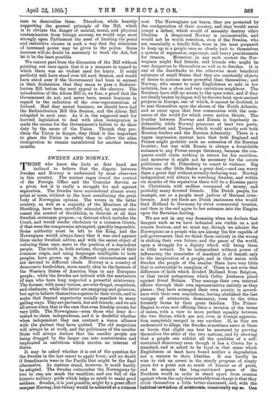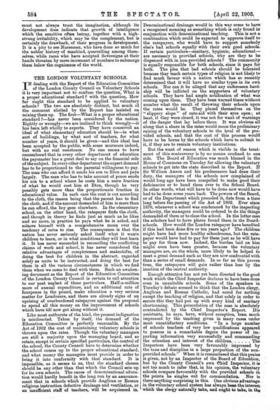T HOSE who know the facts at first hand are inclined
to believe that the dispute between Sweden and Norway is underrated by most observers in this country. The contest rages round the control of the Foreign Office and the Consular Service as a pivot, but it is really a struggle for and against separation. The Swedes have surrendered almost every point at issue, without in the least conciliating the great body of Norwegian opinion. The voters in the latter country, as well as a majority of the Members of the Storthing, have been carefully educated, by orators who resent the control of Stockholm, in distrust of all that Swedish statesmen propose,—a distrust which includes the Court, and would render obedience to a common Crown, if that were the compromise attempted, speedily impossible. Some authority must be left to the King, and the Norwegians would always fancy that it was used against them under Swedish advice, and with the secret object of reducing them once more to the position of a dependent people. The truth is, both nations, though aware of their common origin, and using languages intelligible to both peoples, have grown up in different circumstances and are devoted to different ideals. Norway is a country of democratic freeholders, more nearly akin to the farmers of the Western States of America than to any European people ; while the Swedes are imbued with the sentiments of men who have long respected a powerful aristocracy. The former, with many virtues, are over-frugal, suspicious, and obstinate; while the latter are easygoing and generous, but apt to believe themselves superior to their rivals, and. to make that fancied superiority socially manifest in many galling ways. They are partners, but not friends; and we are all aware when that is the case that even kinship counts for very little. The Norwegians—even those who deny it— intend to claim independence, and it is doubtful whether when independent they can contract a warm alliance with the partner they have quitted. The old suspicions will always be at work, and the politicians of the smaller State will always declare that the smaller people are being dragged by the larger one into controversies and implicated in ambitions which involve no interest of theirs.
It may be asked whether it is out of the question for the Swedes in the last resort to apply force; and no doubt if Scandinavia were in the Pacific that might be the final alternative. As matters stand, however, it could hardly be adopted. The Swedes outnumber the Norwegians by two to one, are much the wealthier, and. are full of the historic military pride which helps so much to make good soldiers. Sweden, it is just possible, might by a great effort conquer Norway, but victory would be achieved at a ruinous cost. The Norwegians are brave, they are protected by' the configuration of their country, and they would never accept a defeat, which would of necessity destroy other liberties. A dragooned Norway is inconceivable, and. would not be worth retention, even if the Swedes, who are essentially a kindly folk, were in the least prepared to keep up in a people once so closely knit to themselves a system of repression, espionage, and heavy punishments for treason. Moreover, in any such contest the Nor- wegians might find friends, and friends who might be very dangerous to themselves as well as to Sweden. It is one of the drawbacks to the otherwise most beneficial existence of small States that they are constantly objects of desire to nations more powerful than themselves ; and Norway, who seems to most Englishmen so safe in her isolation, has a close and very ambitious neighbour. The Russians have still no access to the open water, and if they are finally beaten by Japan will be thrown back upon ancient projects in Europe, one of which, it cannot be doubted, is to seat themselves upon the shores of the North Atlantic, and so enter upon that free communion with the com- merce of the world for which every nation thirsts. The frontier between Norway and Russia is hopelessly in- defensible, while Norway possesses at least two ports, Hammerfest and Tromso, which would exactly suit both Russian traders and the Russian Admiralty. There is a vague impression current here that both England and. France plight prohibit such an extension of the Russian frontier ; but war with Russia is always a formidable nuisance to any Power except Germany, because the con- queror could claim nothing in return for his sacrifices, and. moreover it might not be necessary for the astute politicians of St. Petersburg to resort to violence. Big States can offer little States a great deal,—and. can worry them a great deal without actually declaring war. Norway independent will always be watching Sweden, and within six months of the separation there will be a Russian party in Christiania with endless command of money, and probably many devoted friends. The Dutch people, for example, are as a people most jealous of German inter- ference. And yet there are Dutch statesmen who would bind Holland to Germany by strict commercial treaties, and then in the end agree to her entrance into the Empire upon the Bavarian footing.
We are not in any way dreaming when we declare that dangers such as we have indicated are visible on a not remote horizon, and we must say, though we admire the Norwegians as a people who are among the few capable of self-government, that we think them entirely in the wrong in staking their own future, and the peace of the world, upon a struggle for a dignity which will bring them so little reward. To be independent without power of influencing the remainder of mankind is of benefit only to the imagination of a people, and in their union with Sweden the people of the smaller State have very little that is substantial to complain of. There is not even that difference of faith which divided Holland from Belgium, or that racial antagonism which Celtic Irishmen plead against Great Britain. They manage their own internal affairs through their own representatives entirely as they please ; they have arranged their own society in accord- ance with their own convictions, having abolished the last vestiges of aristocratic dominancy, even to the titles formerly borne by their great families. The Prince- Regent is even now offering them a, revision of the terms of union, with a view to more perfect equality between the two States, which are not, even in foreign apprecia- tion, completely merged in one another. If, as they are understood to allege, the Swedes sometimes sneer at them as boors, that slight can best be answered by proving themselves the abler of the two nations, and by showing that a people can exhibit all the qualities of a self- restrained democracy even though it has a Crown for a standard, and is asked to be loyal in that sense which Englishmen at least have found neither a degradation nor a menace to their liberties. It can hardly be wise to risk an arrest in the steady progress of ninety years for a point not so much of honour as of pride, and to menace the long-continued peace of the Northern world in order to stand apart from cousins against whom the only demonstrably true charge is that they think themselves a little better-mannered, and, with the habitual unwisdom of aristocrats, occasionally say so. One must not always trust the imagination, although its development does indicate that growth of intelligence which the sensitive often betray, together with a high- strung irritability, which may be the complement, but is certainly the drawback, of their progress in development. It is a pity to see Norsemen, who have done so much for the nobler history of mankind, quarrelling among them- selves, while races who have accepted Sovereigns at their hands threaten by mere increment of numbers to submerge them below the cognisance of the world.



































 Previous page
Previous page